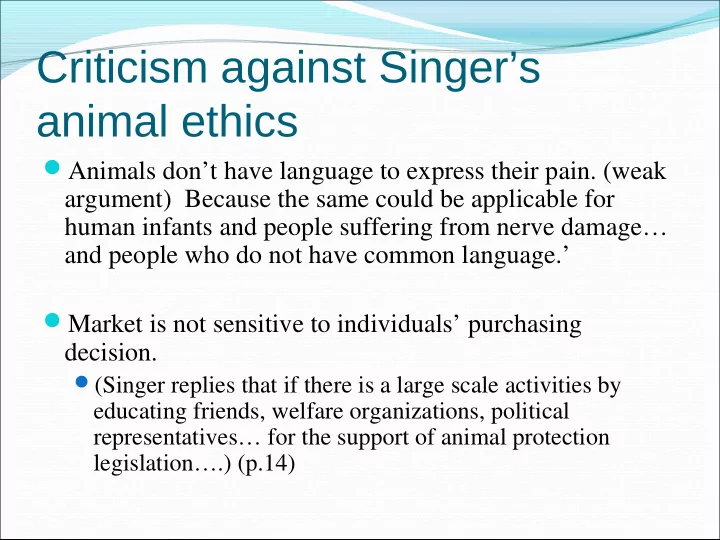

Criticism against Singer’s animal ethics Animals don’t have language to express their pain. (weak argument) Because the same could be applicable for human infants and people suffering from nerve damage… and people who do not have common language.’ Market is not sensitive to individuals’ purchasing decision. (Singer replies that if there is a large scale activities by educating friends, welfare organizations, political representatives… for the support of animal protection legislation….) (p.14)
Strong Arguments Can animals be killed if their living condition is better and they don’t feel pain? Improved genetic engineering if helps in arising animals intensively without suffering. (St. Louis and Adam Shriver, cf. p.14) Tom Regan ‘believes that utilitarianism is seriously deficient because it fails to recognize the value of individuals life except as “vessels” of utility.’ (p.14) the value of life is more than satisfaction of preferences.
Regan’s & Singer’s Kantian Considerations “Life, at least at a certain level of complexity, deserves respect, … [can be done] by recognizing the rights.” “This respect is due regardless of how many people recognize it and regardless of the contribution of the bearer of this life to the well being of others.” Life matters to us .. We are not only sentient beings, but also conscious beings … ‘experiencing subject of a life’ with desires, preferences, memories, expectation, hopes, dreams, and disappointments.’ (p.14)
The larger goal Widening of “the moral community.” In last 200 years the western society has experienced: Abolition of slavery Equal status to women (gender equality) Assistance to poor and accept refugees (by some countries) Freedom of religion The supporters of animal rights movement ‘is the next step in the moral progress of the humanity.’ (p.15)
Duties to the Endangered Species An adequate ethic for preserving species requires an unprecedented mix of biological science and ethics. Holmes Rolston III, 1985 Bioscience , 35, 718-26
Are their no direct duties for endangered species? A) protection of nature and preservation of species is important if we are sentimentally and emotionally interested B) Deeper sense of obligation. Duty not only to harm others but also to help others E.g. Suppose scientific study reveals that ark has medicinal value or pupfish as it thrives in extremes ‘can serve as useful future research on human kidney’
Analogy “Destroying species is like tearing pages out of an unread book, written in a language of humans hardly know how to read, about the place where they live. No sensible person would destroy Rosetta Stone, (tigers, Rhinos, vultures,… ) [if someone says] humans do not have duty to the book, the stone, the species but to ourselves, duties of prudence and education.
Pragmatic concern Humans need insight into the full text of ecosystem evolution. It is not endangered species but an endangered human future that is of concern.
Valuing “Valuing speciation directly, however, seems to attach value to the evolutionary process, not merely to the subjective experiences that arise when humans reflect over it.” (Rolston III 1985: 720) Species have intrinsic value
What kind of ethics? “Ethics has always been about partners with entwined destinies. But it has never been very convincing when pleaded as enlightened self-interest. (that one ought always to do what is one’s intelligent self-interest), including class self-interest, even though the practice genuinely altruistic ethics often needs to be reinforced by self-interest.” (Ibid.)
What humans have learned? “Humans have learned some intraspecific altruism. The challenge now is to learn some interspecific altruism.” “What is required is not prudence but principled responsibility to the biosphere.” (Ibid.)
Deep Ecology Arne Naess (1973) a Norwegian Philosopher, describes a philosophical method of inquiry that sought deeper relationships to the natural world, that viewed humans are embedded in nature, rather than separate from nature. Negative human intervention through the use of pesticide sought to combine the ecological awareness with the Gandhian non-violence principles.
What does deep signify? Deep experience Deep questioning Deep commitment Ecological wisdom as a way of being, thinking, and acting in the world.
Deep ecology gave importance to Intrinsic value of life including nonhuman life to be cultivated through the process of self-realization Understanding the interconnectedness and recognizing human dependence on other life ‘The ecological self’
Eight points of deep ecology 1. all life has value in itself, independent of its usefulness to humans 2. richness and diversity contribute to life’s well-being and have value in themselves 3. humans have no right to reduce this richness and diversity except to satisfy their vital needs in a responsible way 4. the impact of humans is excessive and rapidly getting worse 5. human life-style and population are the key elements of this impact
Conti….. 6. the diversity of life, including cultures, can flourish only with reduced human impact 7. basic ideological, political and economic, and the technological structures must therefore change, 8. those who accept the foregoing points have an obligation to participate in implementing the necessary changes and to do so peacefully and democratically.
Recommend
More recommend